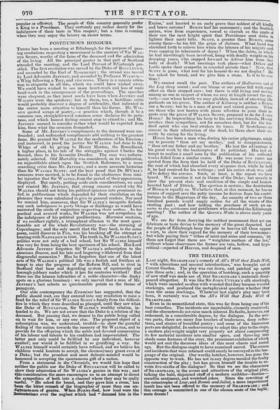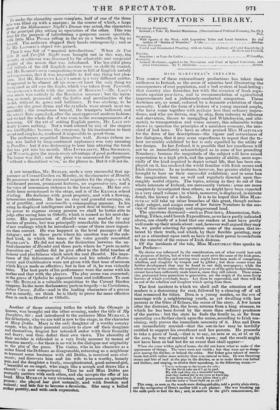THE THEATRES.
LAST night, SHAICSPEARE'S comedy of All's Well that Ends Well, " with alterations and musical introductions," was brought out at Covent Garden. The play was cut down, and patched up again into three acts ; and, in the operation of botching, such a quantity of new stuff was made use of, that SHAKSPEARE s materials disap- peared altogether. It was like Sir JOHN CUTLER'S silk stockings, which were mended so often with worsted that they became worsted stockings, and produced the metaphysical question whether they were the same stockings. Whatever last night's play may have been, it certainly was not the All's Well that Ends Well of
SHARSPEARE.
Even in its unmutilated state, this was far from being one of his best comedies. The incidents are improbable, clumsily contrived; and the characters do not raise much interest. Its faults, however, are redeemed, in a considerable degree, by the dialogue. In the seri- ous parts, there are many fine touches of tenderness, deep reflec- tions, and strains of beautiful poetry; and some of the humorous parts are delightful. In endeavouring to adapt this play to the stage, a modern playwright might very properly set about compressing its few material incidents into smaller space, andthrowing into shade some features of the story, the prominent exhibition of which would not suit the decorous ideas of this most chaste and moral age. But the dialogue ought to have remained sacred. The scenes and incidents that were retained could surely be conveyed in the lan- guage of the original. Our worthy botcher, however, has gone the opposite way to-work. He has not in any degree mended the faulty construction of -the play ; but has given himself the trouble to re- write five;-sixths of the dialogue! So that we see the characters of SHARSPEARE, in the scenes and situations of the original play, talking the bald, disjointed stuff of a modern scribbler—fustian- maudlin sentiment, and wretched jokes. Since the rewriting of the catastrophe of Lear, and Romeo and Juliet, a more impertinent insult has not been offered to the memory of SHAKSPEARE ; and this outrage is committed in one of the chosen seats of the legitij mate drama! To make the absurdity more -Complete, half 'of one of the three acts was filled up with a masque; in the course of which, a large Piece of the Midsummer Night's Dream was acted, the characters of the principal play sitting as spectators of the other. This was done for the purpose 'of introducing a gorgeous scenic spectiele, with little Miss POOLE riding in the air on a butterfly as big as herself. The audience clapped their hands outrageously ; and so far M. LAPORTE'S object was gained. Then it was full of "musical introductions." When As You Like It and Twelfth Night were brought out in this way, the severity of criticism wasdisarmed by the admirable and congenial quality of the music that was introduced. The beautifidglees and ballads of the old English masters were so skilfully treated, and Mr. BISHOP'S own compositions were so full of English melody
that it was impossible to feel any thing but plea-
and expression, sure. But .Mr. Rorni NO LACY'S music is a very different matter. It appeared to be almost all his own—at least the only thing we recognized as old was the finale, which was taken from Tancredi. Aeseslee's words with the notes of Rossi en !—Mr. LACY'S oW11 music was entirely in the Rossinian manner ; but the imita- tion, as usual, possessed only the faults and peculiarities of the anodel, without its grace and brilliancy. It was striking, to be surc,—for the great dram and the cymbals were struck most un- mercifully ; the trombones brayed, the trumpets bellowed, and the octave flute squeaked, after the most approved modern fashion; and we had the whole din of war even in the accompaniments of a love-song. Of the art of setting English poetry, Mr. LACY evi- dently knows nothing. Not a word uttered by any of the singers was intelligible; because the composer, by his inattention to their accent and emphasis, rendered it impossible to speak them. The performers acquitted. themselves well. JONES (whose re- turn was hailed by long-continued applauses) was very amusing in Parolles ; but it was distressing to hear him uttering the trash that was put into his mouth. Miss INVERARITY, Miss SHIRREFF, and WILSON, gave the music every advantage of good performance. The house was full ; and the piece was announced for repetition " without a dissentient voice," as the phrase is. But it will not do.




























 Previous page
Previous page